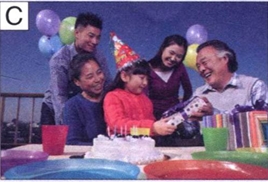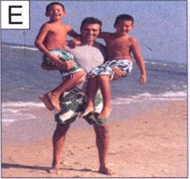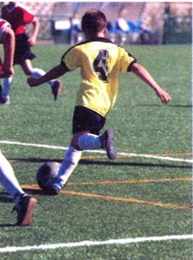热身 Warm-up
1 给下面的词语选择对应的图片
Match the pictures with the words/phrases.

A

B

C

D

E

F
- shēngrì 生日 ________
- wǎnshang 晚上 ________
- liǎng gè ér zi 两个儿子 ________
- diànhuà 电话 ________
- kàn shū 看书 ________
- gōngzuò 工作 ________
2 看下面的图片,给这些名词搭配合适的动词
Look at the pictures and add an appropriate verb before each noun.

________ māma 妈妈

________ yīshēng 医生

________ péngyou 朋友

________ diànhuà 电话
课文 Text
1 在教室 In the classroom 04-1
Shēngrì kuàilè! Zhè shì sòng gěi nǐ de!
A: 生日 快乐!这是 送 给你的!
Shì shénme? Shì yì běn shū ma?
B: 是 什么?是一本书吗?
Duì, zhè běn shū shì wǒ xiě de.
A: 对,这 本 书 是我写的。
Tài xièxie nǐ le!
B: 太谢谢你了!

| English Version | New Words |
|---|---|
|
A: Happy birthday! This is for you. B: What is it? Is it a book? A: Yes. A book written by me. B: Thank you so much! |
1. 生日 shēngrì n. birthday 2. 快乐 kuàilè adj. happy, glad 3. 给 gěi prep. (used after a verb) to, for |
2 在家里 At home 04-2

Zǎoshang yǒu nǐ yí gè diànhuà.
A: 早上 有你一个 电话。
Diànhuà shì shéi dǎ de?
B: 电话 是谁 打的?
Bù zhīdào, shì érzi jiē de.
A: 不知道,是儿子接的。
Hǎo, wǎnshang wǒ wèn yíxià érzi.
B: 好, 晚上 我 问 一下儿子。
| English Version | New Words |
|---|---|
|
A: Someone called you this morning. B: Who? A: I don’t know. Our son answered it. B: OK. I’ll ask him about it this evening. |
*4. 接 jiē v. to receive, to take, to accept 5. 晚上 wǎnshang n. evening, night 6. 问 wèn v. to ask |
Nǐ xǐhuan tī zúqiú ma?
A: 你喜欢踢足球吗?
Fēicháng xǐhuan.
B: 非常 喜欢。
Nǐ shì shénme shíhou kāishǐ tī zúqiú de?
A: 你是 什么 时候开始踢足球的?
Wǒ shíyī suì de shíhou kāishǐ tī zúqiú, yǐjīng tī le shí nián le.
B: 我十一岁的时候开始踢足球,已经踢了十年了。

English Version
A: Do you like playing football?
B: Yes, very much.
A: When did you begin to play football?
B: I was 11 when I played football for the first time. It has been 10 years.
New Words
- 7. 非常 fēicháng adv. very, extremely
- 8. 开始 kāishǐ v. to begin, to start
- 9. 已经 yǐjīng adv. already
Nǐ zài zhèr gōngzuò duō cháng shíjiān le?
A: 你在这儿工作 多 长 时间了?
Yǐjīng liǎng nián duō le, wǒ shì
B: 已经 两年 多了,我是
èr líng yī yī nián lái de.
2011 年来的。
Nǐ rènshi Xiè xiānsheng ma?
A: 你认识谢 先生 吗?
Rènshi, wǒmen shì dàxué tóngxué, zhège gōngzuò shì tā bāng wǒ jièshào de.
B: 认识,我们 是大学 同学,这个 工作 是他 帮 我 介绍 的。

English Version
A: How long have you been working here?
B: More than two years, since 2011.
A: Do you know Mr. Xie?
B: Yes. He is my college classmate. He recommended me for this job.
New Words
- 10. 长 cháng adj. long
- 11. 两 liǎng num. two
- 12. 帮 bāng v. to help, to assist
- 13. 介绍 jièshào v. to introduce, to recommend
注释 Notes
1 “是……的” 句:强调施事
The Structure“是……的”: emphasizing the agent of an action
在已经知道事情发生的情况下,可以用 “是……的” 强调动作的发出者。例如:
When the occurrence of an action is known, “是……的” can be used to emphasize the agent of the action. For example:
否定形式在 “是” 的前边加 “不” 。例如:
In the negative form, “不” is added before “是”. For example:
2 表示时间:……的时候 “……的时候” Indicating Time
“数量+的时候” 表示时间。例如:
“Num-M + 的时候” indicates time. For example:
- 今天早上八点的时候我没在家。
- 我十八岁的时候一个人来到北京。
- 我十一岁的时候开始踢足球。
“动词+的时候” 也表示时间。例如:
“V + 的时候” also indicates time. For example:
- 我睡觉的时候,我妈妈在做饭。
- 麦克到学校的时候下雨了。
- 王老师工作的时候,她丈夫开车去医院了。
3时间副词“已经” The Adverb of Time “已经”
“已经”表示动作完成或者达到某种程度。例如:
“已经” indicates that an action has been completed or having reached a certain degree. For example:
- (1)王老师已经回家了。
- (2)我的身体已经好了。
- (3)(足球我)已经踢了十年了。

Comments